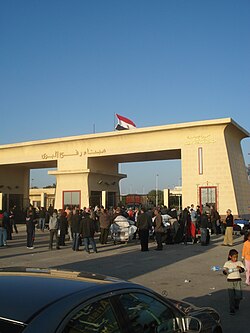Background
The Gaza Strip has been experiencing a humanitarian crisis since the blockade of the Gaza Strip in 2005, a crisis which has been exasperated as a result of the Gaza war. [3] [4] At the start of the war, Israel implemented a complete blockade on the Gaza Strip, which has resulted in significant shortages of fuel, food, medication, water, and essential medical supplies. [3] [5] This siege resulted in a 90% drop in electricity availability, impacting hospital power supplies, sewage plants, and shutting down the desalination plants that provide drinking water. [6] Widespread disease outbreaks have spread across Gaza. [4]
Heavy bombardment by Israeli airstrikes caused catastrophic damage to Gaza's infrastructure, further deepening the crisis. [7] The Gaza Health Ministry reported over 4,000 children killed in the war's first month. [8] UN Secretary-General António Guterres stated Gaza had "become a graveyard for children". [a] [11] [12]
Procedures
Security Council Resolution 2712 was adopted on 15 November 2023, calling for humanitarian pauses in the fighting, [13] [14] and the 2023 Gaza war ceasefire took effect from 24 to 30 November.
The United Nations General Assembly passed (on 12 December 2023) a non-binding resolution with a repeated calling for an "immediate ceasefire" with 153 votes for, 23 abstentions and 10 against. [15]
Resolution 2720, proposed by the UAE, was originally scheduled for a vote on Monday 18 December; however, was delayed multiple times to allow for negotiations with the United States which would allow for the U.S. to not veto the resolution. It was reported that the reason for the delay was differences between the State Department and the White House. [16] The United States expressed reservation with the proposition for a U.N. monitored mechanisms for aid delivery, [17] whereas the United Kingdom explicitly endorsed the resolution. [18]
An amendment introduced by Russia, which would have reinstated the previous draft of the resolution that called for an "urgent suspension of hostilities", received 10 votes in favour and 4 abstentions but was vetoed by the United States. [19]
This page is based on this
Wikipedia article Text is available under the
CC BY-SA 4.0 license; additional terms may apply.
Images, videos and audio are available under their respective licenses.
